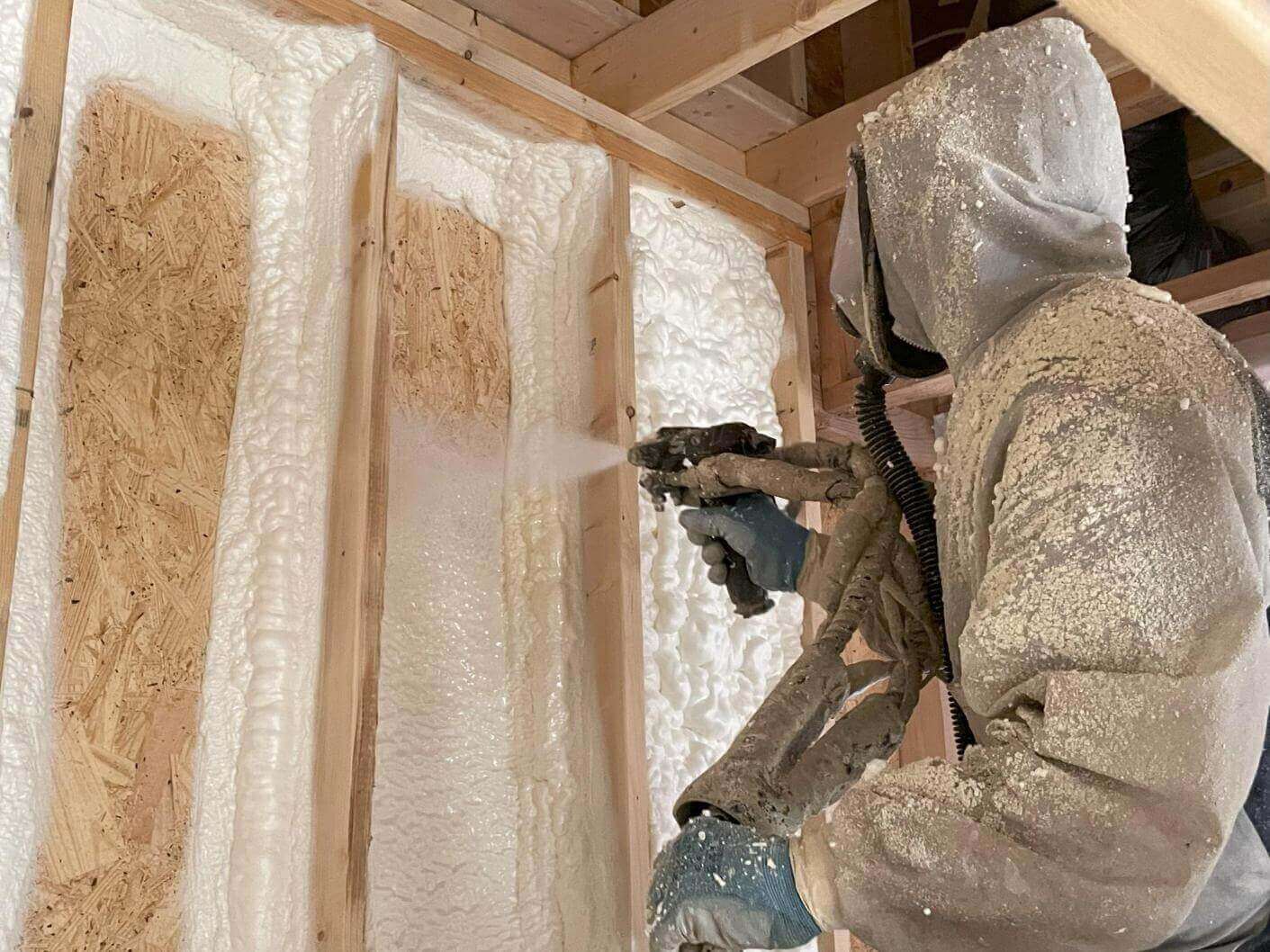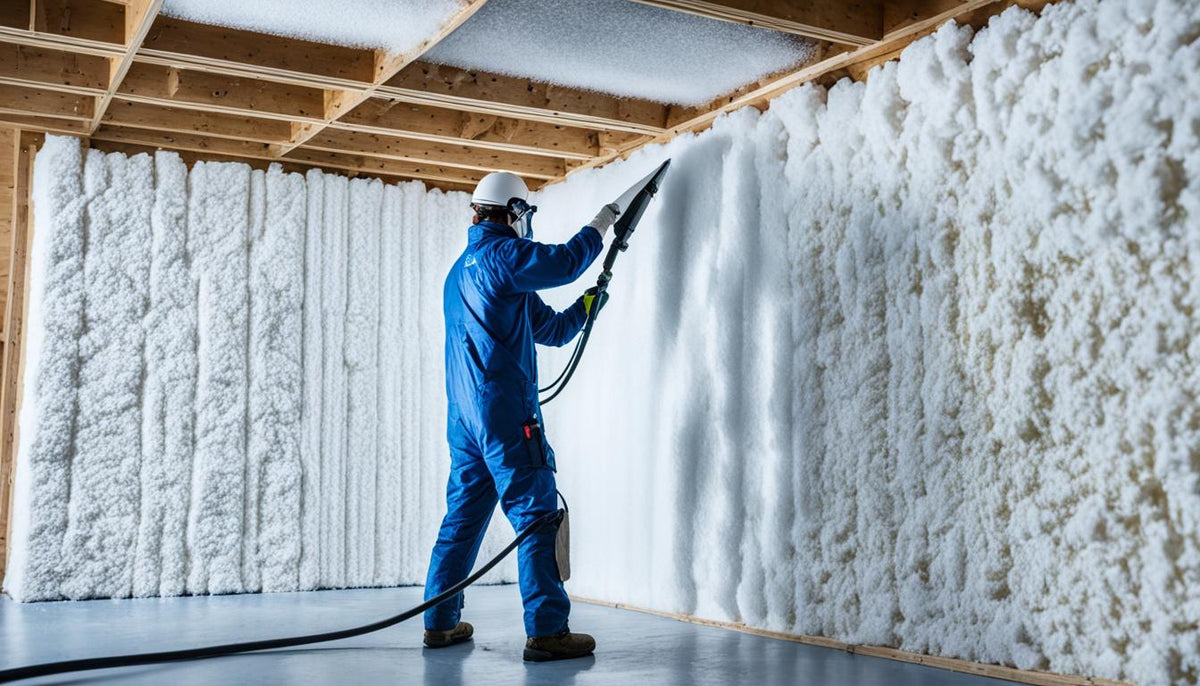Spray Foam: The Ultimate Remedy for Air Sealing and Insulation
Spray foam insulation has arised as a leading option for effective air securing and thermal insulation, using an unique combination of buildings that establish it apart from typical approaches. Comprehending the full extent of its benefits, installation procedures, and comparisons with various other insulation kinds is crucial for making educated choices.
What Is Spray Foam?
Spray foam is a versatile insulation material that integrates the concepts of air sealing and thermal resistance to boost energy efficiency in structures. Made up largely of polyurethane or other comparable substances, spray foam is applied as a fluid that expands upon call with surface areas, developing a strong, constant layer of insulation. This distinct residential or commercial property allows it to fill up spaces, splits, and spaces that traditional insulation materials may neglect, supplying an exceptional air seal.
There are two main types of spray foam: open-cell and closed-cell. Open-cell spray foam is lighter and more versatile, supplying outstanding sound absorption and a reduced R-value per inch - Spray Foam. In comparison, closed-cell spray foam is denser, offering a greater R-value, dampness resistance, and added structural honesty to constructing components
The application procedure normally entails customized devices, guaranteeing a seamless application that follows various substratums, including concrete, wood, and steel. This adaptability makes spray foam suitable for both new constructions and retrofitting existing structures. Its capacity to develop a closed obstacle dramatically adds to decreasing energy usage and improving interior air high quality, therefore making it a preferred selection amongst home owners and builders alike.
Advantages of Spray Foam Insulation
One of the most substantial benefits of spray foam insulation is its exceptional ability to produce a continuous air barrier, which effectively lessens energy loss. Unlike conventional insulation products, spray foam increases to load cracks and spaces, ensuring that air leakage is substantially reduced. This characteristic not only improves power performance yet also leads to decrease utility expenses in time.
Additionally, spray foam insulation offers superior thermal resistance, contributing to an extra steady interior setting. Its high R-value per inch permits for efficient insulation in restricted spaces, making it perfect for attic rooms, wall surfaces, and crawl spaces. Additionally, the moisture-resistant residential properties of spray foam assistance avoid mold and mold growth, promoting much healthier living conditions.
An additional important benefit of spray foam insulation is its sound-dampening top qualities (Spray Foam). It successfully reduces noise transmission between areas, creating a quieter and extra comfortable home setting. The durability of spray foam additionally sticks out, as it does not sag or clear up over time, preserving its performance throughout its life expectancy
Just How Spray Foam Works
Comprehending how spray foam insulation works is essential for appreciating its performance in air sealing and thermal resistance. Spray foam insulation includes 2 primary elements: isocyanate and polyol material. When these components are blended, they undertake a chemical reaction that causes the product to expand quickly, developing a thick foam that fills tooth cavities, spaces, and splits.
As the foam expands, it sticks to surface areas, forming an impermeable seal that considerably minimizes air seepage. This particular makes spray foam insulation highly reliable at protecting against drafts and dampness penetration, which can lead to energy loss and damages over time. In addition, the closed-cell variation of spray foam provides superior thermal resistance because of its inflexible framework, efficiently decreasing warmth transfer.
The unique buildings of spray foam permit it to adjust to irregular surface areas, making certain comprehensive protection and a seamless barrier. Therefore, spray foam insulation not only enhances energy efficiency but additionally adds to boosted interior air top quality by minimizing the build-up of pollutants and irritants. Eventually, comprehending the auto mechanics behind spray foam highlights its function as an exceptional read review choice for insulation and air securing in both commercial and domestic applications.
Installation Process Review

Before setup, the room must be effectively cleaned and prepped, guaranteeing that surface areas are without dampness, particles, and dust. Due to the fact that contaminants can compromise adhesion and overall performance, this step is important. As soon as the location is prepared, the application entails blending the 2 components of the spray foam, which expands upon contact and fills gaps efficiently.
Trained experts ought to carry out the setup, using specific devices to make sure uniform protection and ideal density. discover this info here Safety precautions, including putting on safety equipment and making sure appropriate ventilation, are crucial throughout this process. After application, the foam usually remedies quickly, forming a strong obstacle that enhances energy performance.
Contrasting Spray Foam to Standard Insulation
When evaluating insulation options, spray foam insulation stands out in comparison to traditional materials such as fiberglass and cellulose. Unlike fiberglass and cellulose, which can allow air infiltration, spray foam increases upon application, filling up gaps and gaps to develop a closed seal.
In addition, spray foam offers a greater R-value per inch than conventional insulation kinds, providing even more efficient thermal resistance in a thinner account. This particular is especially beneficial precede with limited tooth cavity depth. Spray More Info foam is resistant to wetness and mold and mildew development, which can be a significant worry with cellulose and fiberglass, specifically in humid atmospheres.
Nonetheless, spray foam insulation generally carries a greater ahead of time cost than its conventional equivalents. Home owners must evaluate this first financial investment against long-term energy cost savings and efficiency advantages. Inevitably, while both insulation types serve their function, spray foam becomes an extra advanced solution for modern insulation needs, especially in terms of air sealing and thermal effectiveness.

Final Thought
In summary, spray foam insulation represents a highly effective solution for accomplishing ideal air securing and thermal resistance. Its special buildings, consisting of dampness resistance and noise dampening, make it appropriate for various applications in both new building and constructions and retrofitting tasks (Spray Foam). The first expenses may be greater compared to traditional insulation products, the long-term advantages, such as considerable power cost savings and improved indoor air top quality, validate the investment and highlight its value in modern-day building methods.
Spray foam insulation has arised as a leading service for reliable air sealing and thermal insulation, supplying a special combination of properties that establish it apart from typical techniques.Spray foam is a functional insulation material that incorporates the principles of air securing and thermal resistance to enhance energy performance in buildings.When reviewing insulation alternatives, spray foam insulation stands out in comparison to standard materials such as fiberglass and cellulose. Eventually, while both insulation kinds serve their function, spray foam arises as a more sophisticated remedy for modern-day insulation needs, especially in terms of air securing and thermal efficiency.
In summary, spray foam insulation stands for a very effective option for attaining optimal air sealing and thermal resistance.
Comments on “Typical Myths Regarding Spray Foam: Debunking the Misconceptions”